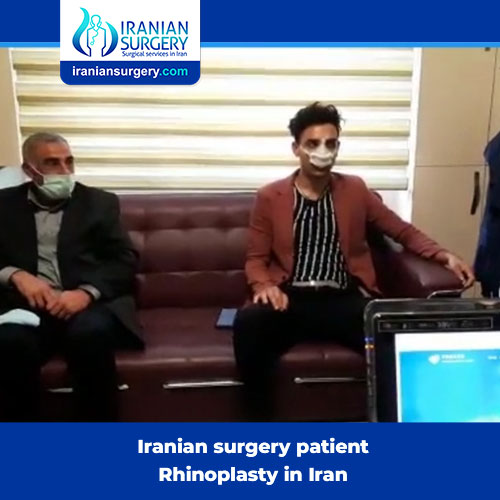When can i smile after rhinoplasty?
When can i laugh after rhinoplasty?
Is laughing after rhinoplasty dangerous?
Is crying after rhinoplasty dangerous?
Laughing hard after rhinoplasty
While it’s great you are in such high spirits during the post-op phase of plastic surgery, something which can be emotionally and physically challenging, it’s important to be cautious. Many rhinoplasty patients express concern about the effects of facial expression and movement during their recovery period, as they want to avoid damaging their new nose.
Although it’s generally agreed among facial plastic surgeons that occasional laughing, yawning, or smiling is not detrimental to your nose while it heals from rhinoplasty surgery, it is advisable to try to limit excessive facial animation, particularly in the first few weeks following your procedure.

To elucidate, tiny muscles connect the tip of your nose with your upper lip, and when you smile or laugh these muscles lower the top of your nose. The sutures which hold the nasal tip cartilage are delicate, so it’s best to allow this area to heal before subjecting it to excessive movement from facial emoting. There are also sutures inside the nose holding everything in place. Sudden or extreme movement of the facial muscles can impact these sutures, causing them to give way and bleeding to occur.
Read more about : Rhinoplasty in Iran
Is it bad to laugh after rhinoplasty?
Although it’s generally agreed among facial plastic surgeons that occasional laughing, yawning, or smiling is not detrimental to your nose while it heals from rhinoplasty surgery, it is advisable to try to limit excessive facial animation, particularly in the first few weeks following your procedure. Because it can push the sutures and make it harder for you to breathe later.
What’s most important is to avoid touching or rubbing your nose, as this is much more detrimental.
Laughing hard, crying and yawning after rhinoplasty
If you laugh a little too hard and feel pain in your nose, this means you have exceeded the limit. In addition to laughing, crying after nose surgery is forbidden! When you cry vigorously, the nasal muscles shrink and the same story of laughter for the newly operated nose is repeated. Finally, avoid yawning or wide mouth opening for two weeks after surgery.
Read more about : How to clean nose after rhinoplasty?
Read more about : Blackheads after rhinoplasty
Before rhinoplasty surgery
Before scheduling a rhinoplasty, you should meet with your surgeon to discuss important factors that determine whether the surgery is likely to work well for you. This meeting generally includes the following:
Your medical history:
The most important question your doctor will ask about your motives for surgery and your goals. Your doctor will also ask questions about your medical history - including the history of nose obstruction, surgery, and any medications you take. If you have a bleeding disorder, such as hemophilia, you may not be a candidate for rhinoplasty.
Physical exam:
The doctor will perform a complete physical examination, including any laboratory tests, such as blood tests. He or she will also lose your skin and inside and outside the nose. Physical examination helps your doctor determine what changes need to be made and how your physical attributes - for example, your skin thickness or cartilage strength at the end of your nose - affect your results. Physical examination is also important to determine the effect of nose-nose surgery on your breathing.
Photography:
Someone from the doctor's office may take pictures of your nose from different angles. The surgeon may use computer programs to simulate images to show you the kinds of possible results. Your doctor will use these images for previous, subsequent and referral evaluations during surgery and long-term reviews. More importantly, images allow for a specific discussion about the objectives of surgery.
Discuss your expectations:
You and your doctor should talk about your motives and expectations. You will be told what you can and cannot do for your nose and what your results might be. It is normal for people to feel self-conscious in discussing their appearance, but it is important to be open with your wounds about your wishes and goals in surgery.
Sometimes the surgeon may talk to you about surgery to increase your chin. This is because a small chin will create their nose bigger. Chin surgery is not required under these conditions, but it may better balance facial features. Once the procedure is determined, you will need to arrange someone to take you home if you have an outpatient procedure. In the first few days after anesthesia, you may have convulsions in memory, slow reaction time and reduce judgment. So arrange a meeting with a family member or a friend at night or two to help with personal care tasks while recovering from surgery.
Food and medicine
Avoid drugs containing aspirin or ibuprofen for 2 weeks prior to the procedure of nasal and nasal mobilization. These drugs may increase bleeding. Take only medicines that have been approved or prescribed by the surgeon. If you smoke, stop smoking. Smoking slows the healing process after surgery and makes you more susceptible to infection.
Rhinoplasty surgery Risks and Side effects
Rhinoplasty surgery risks include:
. Anesthesia risks
. Infection
. Poor wound healing or scarring
. Change in skin sensation (numbness or pain)
. Nasal septal perforation (a hole in the nasal septum) is rare. Additional surgical treatment may be necessary to repair the septum but it may be impossible to correct this complication.
. Difficulty breathing
. Unsatisfactory nasal appearance
. Skin discoloration and swelling
. Possibility of revision surgery
Read more about : When can i touch my nose after rhinoplasty?
Read more about : How to clean nose after rhinoplasty?
During rhinoplasty surgery
Does rhinoplasty require general anesthesia?
Rhinoplasty surgery requires local anesthesia with sedation or general anesthesia, depending on how complex your surgery is and what your surgeon prefers. Discuss with your rhinoplasty surgeon before rhinoplasty surgery which type of anesthesia is most appropriate for you.
Read more about facelift surgery
Local anesthesia with sedation, this type of anesthesia is usually used in an outpatient setting and it's limited to a specific area of your body. Your rhinoplasty surgeon injects a pain-numbing medication into your nasal tissues and sedates you with medication injected through an intravenous (IV) line. This makes you groggy but not fully asleep.
General anesthesia, you receive the drug (anesthetic) by inhaling it or through a small tube (IV line) placed in a vein in your hand, neck or chest. General anesthesia affects your entire body and causes you to be unconscious during surgery. General anesthesia requires a breathing tube.
Read more about Infective complications related to Rhinoplasty surgery
During Procedure
Rhinoplasty surgery may be done inside your nose or through a small external cut (incision) at the base of your nose, between your nostrils. Your surgeon will likely adjust the bone and cartilage underneath your skin. Your rhinoplasty surgeon can change the shape of your nasal bones or cartilage in several ways, depending on how much needs to be removed or added, your nose's structure, and available materials. For small changes, the surgeon may use cartilage taken from deeper inside your nose or from your ear. For larger changes, the surgeon can use cartilage from your rib, implants or bone from other parts of your body.
After these changes are made, the rhinoplasty surgeon places the nose's skin and tissue back and stitches the incisions in your nose. If the wall between the two sides of the nose (septum) is bent or crooked (deviated), the surgeon can also correct it to improve breathing. After the rhinoplasty surgery, you’ll be in a recovery room, where the staff monitors your return to wakefulness. You might leave later that day or, if you have other health issues, you might stay overnight.
Read more about IVF Process
What you can expect after rhinoplasty surgery?
Nose protector after surgery
. After rhinoplasty process you need to rest in bed with your head lifted above your chest, to reduce bleeding and swelling. Your blockage may be crowded due to swelling or lumps in your nose during the procedure of the nose. In most cases, the internal dressings remain in place for one to seven days after the procedure of the nose. Your doctor also delivers a splint to your nose for protection and support. Usually it is in place for one week. Slight bleeding, discharge of mucus and old blood are common for a few days after nasal mobilization or after removal.
. Your doctor may place a "drip pad" - a small piece of gauze in place with a bar - under your nose to absorb drainage. Change the gauze as directed by your doctor.
. Do not place a dotting pad on your nose. To further reduce the chances of bleeding and swelling, the doctor may ask you to follow these precautions for several weeks after the procedure of the nose: Avoid hard activities such as aerobics and jogging. Take baths instead of showers while you have bandages on your nose.
Read more about Features of a good Rhinoplasty surgery
. Do not blow your nose.
. Eat foods high in fiber, such as fruits and vegetables, to avoid constipation. Constipation can cause stress, and pressure on the site of the process of the nose.
. Avoid extreme facial expressions, such as smiling or laughing.
. Brush your teeth gently to reduce the movement of the upper lip.
. Wear clothing that installs in front. Do not pull clothes, such as shirts or sweaters, over your head.
. Do not wear glasses or sunglasses on your nose for at least four weeks after surgery, to prevent pressure on your nose. Use sunscreen SPF 30 when you are out, especially on your nose. Too much sun may cause permanent irregular change in the skin of your nose.
. Some temporary swelling or black and blue color of your eyelids may occur for two to three weeks after the procedure of the nasal contraction. The nasal bulge takes longer to resolve.
. Reducing sodium food will help the swelling faster.
. Do not put anything like ice or cold on your nose after the procedure.
. Your nose changes throughout your life, whether or not the procedure is done. For this reason, it is difficult to determine when you got the "end result". However, most of the swelling in the year has gone.







3 Comments
When will my appearance be normal?
Experience has shown that most patients look normal about two weeks after surgery. You may feel that your nose is still swollen and the final result of your operation is not yet known. However, after two weeks you will notice that you are well on your way to recovery.
I have been laughing a lot and feeling pain in my nose would this effect my end result